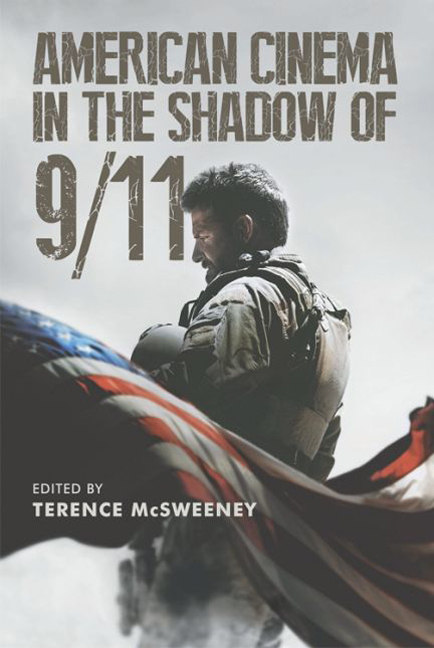Book contents
- Frontmatter
- Contents
- List of Figures
- Acknowledgements
- Foreword
- Introduction: American Cinema in the Shadow of 9/11
- Part I Dramatisations of the ‘War on Terror’
- Part II Influences of the ‘War on Terror’
- 6 ‘Not Now That Strength’: Embodiment and Globalisation in Post-9/11 James Bond
- 7 Training the Body Politic: Networked Masculinity and the ‘War on Terror’ in Hollywood Film
- 8 ‘Gettin' Dirty’: Tarantino's Vengeful Justice, the Marked Viewer and Post-9/11 America
- 9 Stop the Clocks: Lincoln and Post-9/11 Cinema
- 10 Foreshadows of the Fall: Questioning 9/11's Impact on American Attitudes
- Part III Allegories of the ‘War on Terror’
- Selected Filmography
- Notes on the Contributors
- Index
7 - Training the Body Politic: Networked Masculinity and the ‘War on Terror’ in Hollywood Film
from Part II - Influences of the ‘War on Terror’
Published online by Cambridge University Press: 10 May 2017
- Frontmatter
- Contents
- List of Figures
- Acknowledgements
- Foreword
- Introduction: American Cinema in the Shadow of 9/11
- Part I Dramatisations of the ‘War on Terror’
- Part II Influences of the ‘War on Terror’
- 6 ‘Not Now That Strength’: Embodiment and Globalisation in Post-9/11 James Bond
- 7 Training the Body Politic: Networked Masculinity and the ‘War on Terror’ in Hollywood Film
- 8 ‘Gettin' Dirty’: Tarantino's Vengeful Justice, the Marked Viewer and Post-9/11 America
- 9 Stop the Clocks: Lincoln and Post-9/11 Cinema
- 10 Foreshadows of the Fall: Questioning 9/11's Impact on American Attitudes
- Part III Allegories of the ‘War on Terror’
- Selected Filmography
- Notes on the Contributors
- Index
Summary
Released within a few months of one another, the train-themed Hollywood action thrillers Unstoppable (2010) and Source Code (2011) exhibit striking similarities at a range of levels, from surface features of narrative to deeper structures of gendered character function, theme and geopolitical perspective. This essay takes the position that we can fruitfully read these twinned films in tandem as symptomatic of certain distinctive post-9/11 American concerns and, more specifically, a developing conceptualisation of modes of disciplined masculinity necessitated by the nation's ‘War on Terror’. It will work from close readings of these two texts with a particular interest in the ways post-9/11 male heroism is figured as requiring some level of individual agency (in keeping with classical Hollywood convention) but also submission to a militarised logic of networked media surveillance and bodily incorporation. The analysis will then move on to an examination of a still more recent Hollywood action film, 2014's RoboCop, which will be read with reference to the 1987 film of the same name that it reboots, in order to demonstrate the persistence of the modes of masculinity identified in the two train-themed films.
In taking this tack, I am plainly concurring with such analysts of post-9/11 film as Prince (2009), Kellner (2010) and McSweeney (2014), who assert the soundness and utility of reading these works in relation to proximate historical events if done with caution and attention to the specific textual and historical evidence at hand; I also concur with these writers’ assertions that filmic responses to 9/11 and its aftermath, even within Hollywood alone, show substantial variety in political bent and cinematic approach – although in the examples explored in this essay I would claim there is a remarkable and suggestive consistency in narrative and representational patterns, surface differences in style notwithstanding. I am furthermore interested here to connect the broader post-9/11 proclivities such analysts have identified with the loaded significations of the body itself in such productions, ‘the way the body, individual and social, is employed to make sense of terror, conflict, and warfare’, as has been highlighted in Rendell and Redmond's anthology The War Body on Screen (2008: 1); but in so doing, I will also be concerned to keep foregrounded the ways in which the ‘war body’ is a gendered body.
- Type
- Chapter
- Information
- American Cinema in the Shadow of 9/11 , pp. 147 - 168Publisher: Edinburgh University PressPrint publication year: 2017



